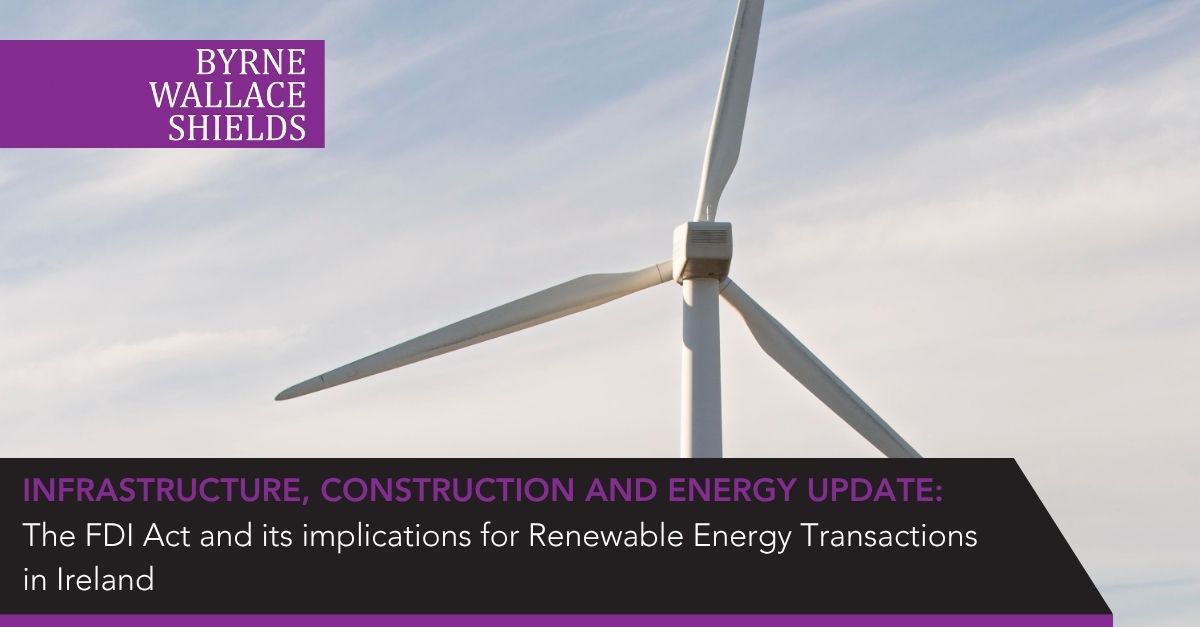The FDI Act and its implications for Renewable Energy Transactions in Ireland
Tuesday, 27 May 2025
Ireland’s renewable energy sector continues to offer strong growth potential supported by ambitious climate targets and increasing investor interest. However, with the introduction of the Screening of Third Country Transactions Act 2023 ('the FDI Act'), foreign direct investment ('FDI') into Ireland’s energy market now faces a somewhat more complex regulatory landscape. This article outlines the scope of the FDI Act and its implications for renewable energy transactions, particularly those involving non-EU/EEA investors.
A New Regulatory Framework for Foreign Investment
The FDI Act which came into force in January 2025 establishes Ireland’s first formal investment screening regime. The legislation is primarily designed to protect national security and public order, aligning Ireland with EU Regulation 2019/452 on foreign direct investment screening and broader global trends in investment scrutiny.
Under the Act, certain transactions involving third-country investors (i.e., non-EU/EEA investors) must be notified to, and approved by, the Minister for Enterprise, Trade and Employment before completion. Affected transactions include:
- Acquisitions of control (defined as greater than 25% of voting rights or capital) in Irish businesses;
- Investments in sectors deemed sensitive, including energy, critical infrastructure, technology and data processing;
- Certain asset or business transfers.
Impacts on Renewable Energy Transactions
The renewable energy sector is explicitly within the scope of the screening regime. This includes transactions involving:
- Wind and solar energy generation assets;
- Battery Storage projects;
- Grid infrastructure;
- Technology providers servicing the energy sector.
For non-EU/EEA investors including global energy funds, infrastructure investors and international utilities, any qualifying investment into these areas may now require pre-clearance under the FDI.
This has practical implications for deal timelines and transaction structuring. Investors and developers must factor in additional regulatory review periods (which may extend up to 90 days) and the potential for the Minister to impose conditions, or in a rare case, prohibit a transaction altogether.
Navigating the new Regime: Risks and Opportunities
While the FDI regime introduces new regulatory hurdles, it also offers clarity on Ireland’s strategic sectors and ensures a level of predictability for foreign investors. Importantly, the Act does not ban investment from third countries but instead aims to screen high-risk transactions.
From a legal perspective, early engagement and integrated transaction planning will be key. Parties should:
- Determine early in the process whether notification is required;
- Build sufficient lead in time into deal timetables;
- Ensure FDI risk is addressed in heads of terms, SPA’s and completion mechanics;
- Liaise with legal advisors on potential mitigations where the transaction may raise concerns.
Ireland continues to welcome investment into the energy sector, and renewable energy remains a critical part of the Government’s strategy to meet its 2030 climate targets. Foreign capital-particularly from institutional and strategic investors will remain central to the delivery of large-scale infrastructure.
Conclusion
The FDI Act marks a significant evolution in Ireland’s regulatory environment for foreign investment, with direct relevance to stakeholders in the renewable energy sector. While it brings added compliance considerations, these are consistent with EU-wide norms and do not diminish the fundamental attractiveness of the Irish energy market.
By proactively managing FDI requirements, investors and project sponsors can continue to participate in Ireland’s energy transition with confidence, supported by a clear legal framework and a stable investment climate.
For more information or advice on the application of the FDI Act to your energy investments or transaction please contact Seanna Mulrean.

